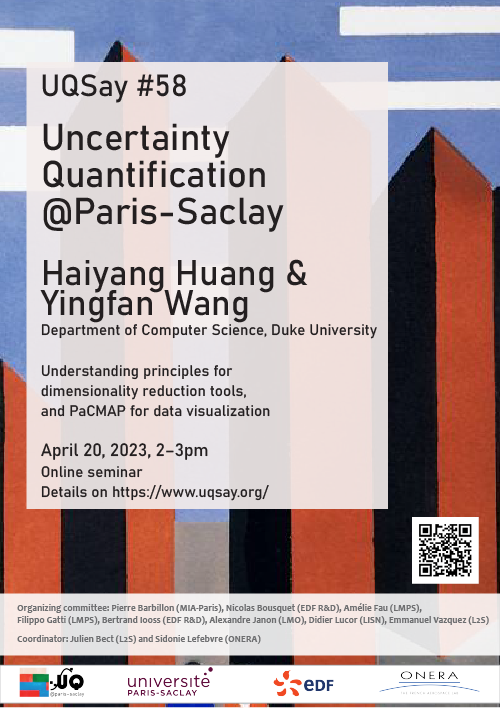The fifty-eighth UQSay seminar on UQ, DACE and related topics will take place online on Thursday afternoon, April 20, 2023.
2–3 PM — Yingfan Wang (Interpretable ML Lab, Duke Univ.) — [slides]
Understanding principles for dimensionality reduction tools, and PaCMAP for data visualization
Dimension reduction (DR) techniques such as t-SNE, UMAP, and TriMap have demonstrated impressive visualization performance on many real-world datasets. One tension that has always faced these methods is the trade-off between preservation of global structure and preservation of local structure. In this work, our main goal is to understand what aspects of DR methods are important for preserving both local and global structure. Towards the goal of local structure preservation, we provide several useful design principles for DR loss functions based on our new understanding of the mechanisms behind successful DR methods. Towards the goal of global structure preservation, our analysis illuminates that the choice of which components to preserve is important. We leverage these insights to design a new algorithm for DR, called Pairwise Controlled Manifold Approximation Projection (PaCMAP), which preserves both local and global structure.
Joint work with H. Huang, C. Rudin & Y. Shaposhnik.
References:
- Wang, Y., Huang, H., Rudin, C. & Shaposhnik, Y. (2021). Understanding how dimension reduction tools work: an empirical approach to deciphering t-SNE, UMAP, TriMAP, and PaCMAP for data visualization. Journal of Machine Learning Research 22.1, 9129-9201. DOI:10.5555/3546258.3546459,
- Huang, H., Wang, Y., Rudin, C. & Browne, E.P. (2022). Towards a comprehensive evaluation of dimension reduction methods for transcriptomic data visualization. Communications biology 5, 719.
DOI:10.1038/s42003-022-03628-x.
Organizing committee: Pierre Barbillon (MIA-Paris), Julien Bect (L2S), Nicolas Bousquet (EDF R&D), Amélie Fau (LMPS), Filippo Gatti (LMPS), Bertrand Iooss (EDF R&D), Alexandre Janon (LMO), Sidonie Lefebvre (ONERA), Didier Lucor (LISN), Emmanuel Vazquez (L2S).
Coordinators: Julien Bect (L2S) & Sidonie Lefebvre (ONERA)
Practical details: the seminar will be held online using Microsoft Teams.
If you want to attend this seminar (or any of the forthcoming online UQSay seminars), and if you do not already have access to the UQSay group on Teams, simply send an email and you will be invited. Please specify which email address the invitation must be sent to (this has to be the address associated with your Teams account).
You will find the link to the seminar on the "General" UQSay channel on Teams, approximately 15 minutes before the beginning.
The technical side of things: you can use Teams either directly from your web browser or using the "fat client", which is available for most platforms (Windows, Linux, Mac, Android & iOS). We strongly recommend the latter option whenever possible. Please give it a try before the seminar to anticipate potential problems.
